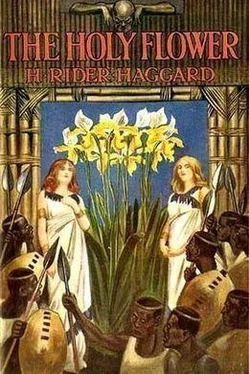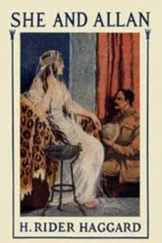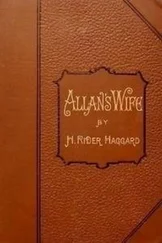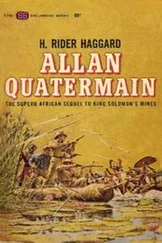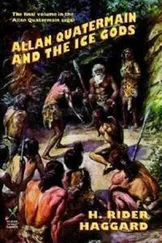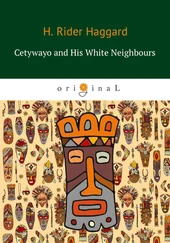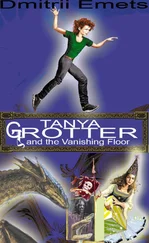I am sure that I could not have done so well with any other rifle, however modern and accurate it might be. But to this little Purdey weapon I had been accustomed from my youth, and that, as any marksman will know, means a great deal. I seemed to know it and it seemed to know me. It hangs on my wall to this day, although of course I never use it now in our breech–loading era. Unfortunately, however, a local gunsmith to whom I sent it to have the lock cleaned, re–browned it and scraped and varnished the stock, etc., without authority, making it look almost new again. I preferred it in its worn and scratched condition.
To return: the sound of the shot, like that of John Peel's horn, aroused Hans from his sleep. He thrust his head between my legs and saw Komba fall.
"Oh! beautiful, Baas, beautiful!" he said faintly. "I am sure that the ghost of your reverend father cannot kill his enemies more nicely down there among the Fires. Beautiful!" and the silly old fellow fell to kissing my boots, or what remained of them, after which I gave him the last of the brandy.
This quite brought him to himself again, especially when he was free from that filthy skin and had washed his head and hands.
The effect of the death of Komba upon the Pongos was very strange. All the other canoes clustered round that in which he lay. Then, after a hurried consultation, they hauled down their sails and paddled back to the wharf. Why they did this I cannot tell. Perhaps they thought that he was bewitched, or only wounded and required the attentions of a medicine–man. Perhaps it was not lawful for them to proceed except under the guidance of some reserve Kalubi who had "passed the god" and who was on shore. Perhaps it was necessary, according to their rites, that the body of their chief should be landed with certain ceremonies. I do not know. It is impossible to be sure as to the mysterious motives that actuate many of these remote African tribes.
At any rate the result was that it gave us a great start and a chance of life, who must otherwise have died upon the spot. Outside the bay the breeze blew merrily, taking us across the lake at a spanking pace, until about midday when it began to fall. Fortunately, however, it did not altogether drop till three o'clock by which time the coast of Mazitu–land was comparatively near; we could even distinguish a speck against the skyline which we knew was the Union Jack that Stephen had set upon the crest of a little hill.
During those hours of peace we ate the food that remained to us, washed ourselves as thoroughly as we could and rested. Well was it, in view of what followed, that we had this time of repose. For just as the breeze was failing I looked aft and there, coming up behind us, still holding the wind, was the whole fleet of Pongo canoes, thirty or forty of them perhaps, each carrying an average of about twenty men. We sailed on for as long as we could, for though our progress was but slow, it was quicker than what we could have made by paddling. Also it was necessary that we should save our strength for the last trial.
I remember that hour very well, for in the nervous excitement of it every little thing impressed itself upon my mind. I remember even the shape of the clouds that floated over us, remnants of the storm of the previous night. One was like a castle with a broken–down turret showing a staircase within; another had a fantastic resemblance to a wrecked ship with a hole in her starboard bow, two of her masts broken and one standing with some fragments of sails flapping from it, and so forth.
Then there was the general aspect of the great lake, especially at a spot where two currents met, causing little waves which seemed to fight with each other and fall backwards in curious curves. Also there were shoals of small fish, something like chub in shape, with round mouths and very white stomachs, which suddenly appeared upon the surface, jumping at invisible flies. These attracted a number of birds that resembled gulls of a light build. They had coal–black heads, white backs, greyish wings, and slightly webbed feet, pink as coral, with which they seized the small fish, uttering as they did so, a peculiar and plaintive cry that ended in a long–drawn e–e–é . The father of the flock, whose head seemed to be white like his back, perhaps from age, hung above them, not troubling to fish himself, but from time to time forcing one of the company to drop what he had caught, which he retrieved before it reached the water. Such are some of the small things that come back to me, though there were others too numerous and trivial to mention.
When the breeze failed us at last we were perhaps something over three miles from the shore, or rather from the great bed of reeds which at this spot grow in the shallows off the Mazitu coast to a breadth of seven or eight hundred yards, where the water becomes too deep for them. The Pongos were then about a mile and a half behind. But as the wind favoured them for a few minutes more and, having plenty of hands, they could help themselves on by paddling, when at last it died to a complete calm, the distance between us was not more than one mile. This meant that they must cover four miles of water, while we covered three.
Letting down our now useless sail and throwing it and the mast overboard to lighten the canoe, since the sky showed us that there was no more hope of wind, we began to paddle as hard as we could. Fortunately the two ladies were able to take their share in this exercise, since they had learned it upon the Lake of the Flower, where it seemed they kept a private canoe upon the other side of the island which was used for fishing. Hans, who was still weak, we set to steer with a paddle aft, which he did in a somewhat erratic fashion.
A stern chase is proverbially a long chase, but still the enemy with their skilled rowers came up fast. When we were a mile from the reeds they were within half a mile of us, and as we tired the proportion of distance lessened. When we were two hundred yards from the reeds they were not more than fifty or sixty yards behind, and then the real struggle began.
It was short but terrible. We threw everything we could overboard, including the ballast stones at the bottom of the canoe and the heavy hide of the gorilla. This, as it proved, was fortunate, since the thing sank but slowly and the foremost Pongo boats halted a minute to recover so precious a relic, checking the others behind them, a circumstance that helped us by twenty or thirty yards.
"Over with the plant!" I said.
But Stephen, looking quite old from exhaustion and with the sweat streaming from him as he laboured at his unaccustomed paddle, gasped:
"For Heaven's sake, no, after all we have gone through to get it."
So I didn't insist; indeed there was neither time nor breath for argument.
Now we were in the reeds, for thanks to the flag which guided us, we had struck the big hippopotamus lane exactly, and the Pongos, paddling like demons, were about thirty yards behind. Thankful was I that those interesting people had never learned the use of bows and arrows, and that their spears were too heavy to throw. By now, or rather some time before, old Babemba and the Mazitu had seen us, as had our Zulu hunters. Crowds of them were wading through the shallows towards us, yelling encouragements as they came. The Zulus, too, opened a rather wild fire, with the result that one of the bullets struck our canoe and another touched the brim of my hat. A third, however, killed a Pongo, which caused some confusion in the ranks of Tusculum.
But we were done and they came on remorselessly. When their leading boat was not more than ten yards from us and we were perhaps two hundred from the shore, I drove my paddle downwards and finding that the water was less than four feet deep, shouted:
Читать дальше
Конец ознакомительного отрывка
Купить книгу
